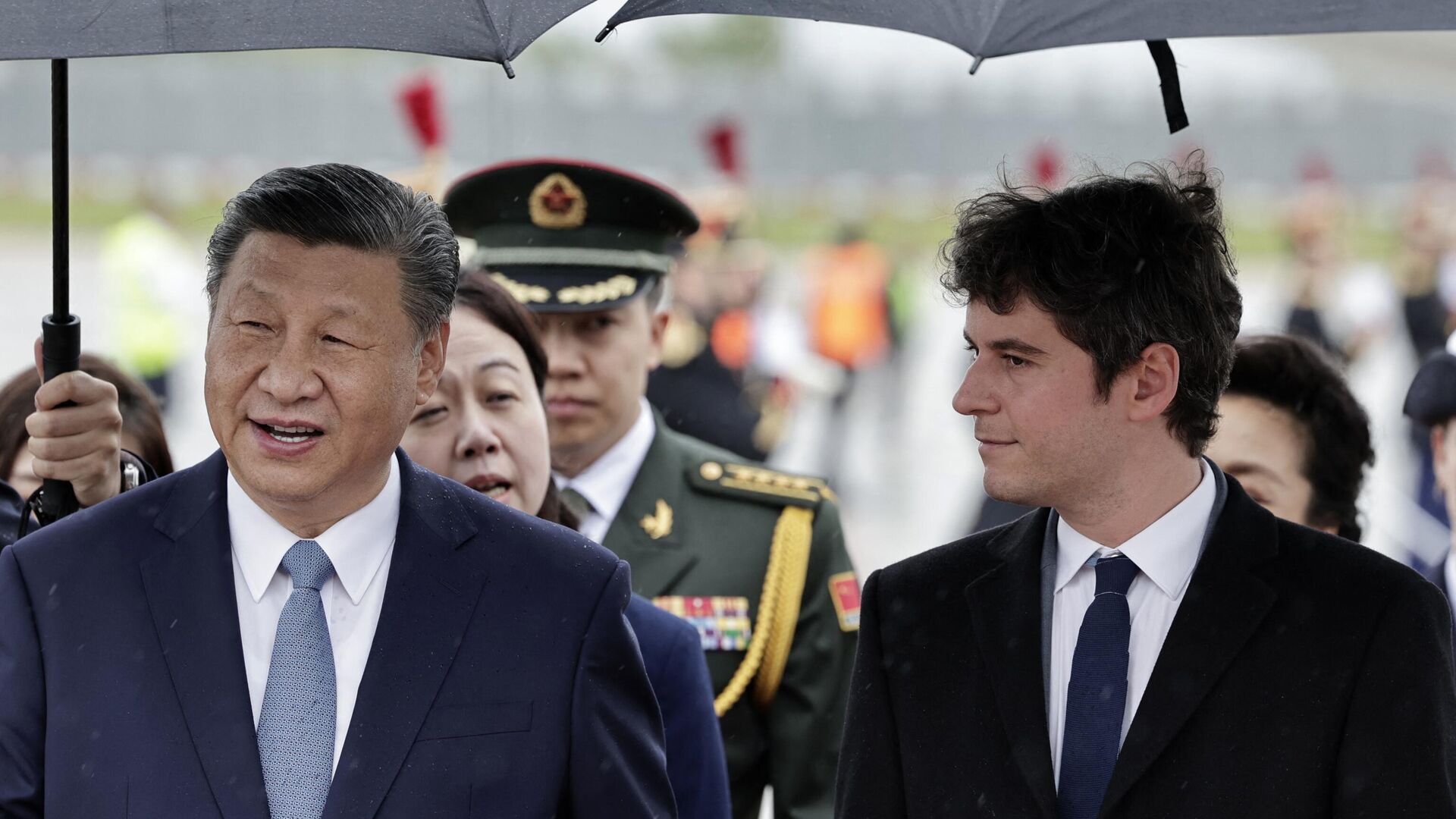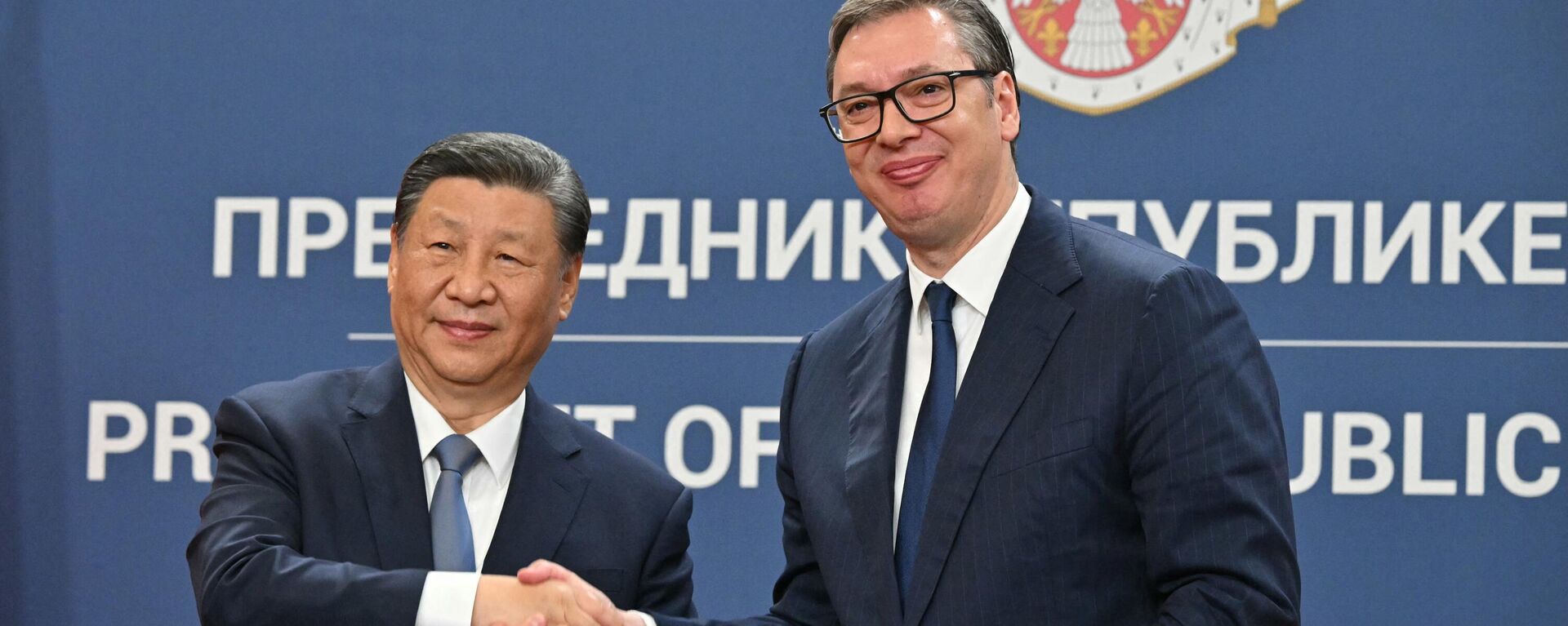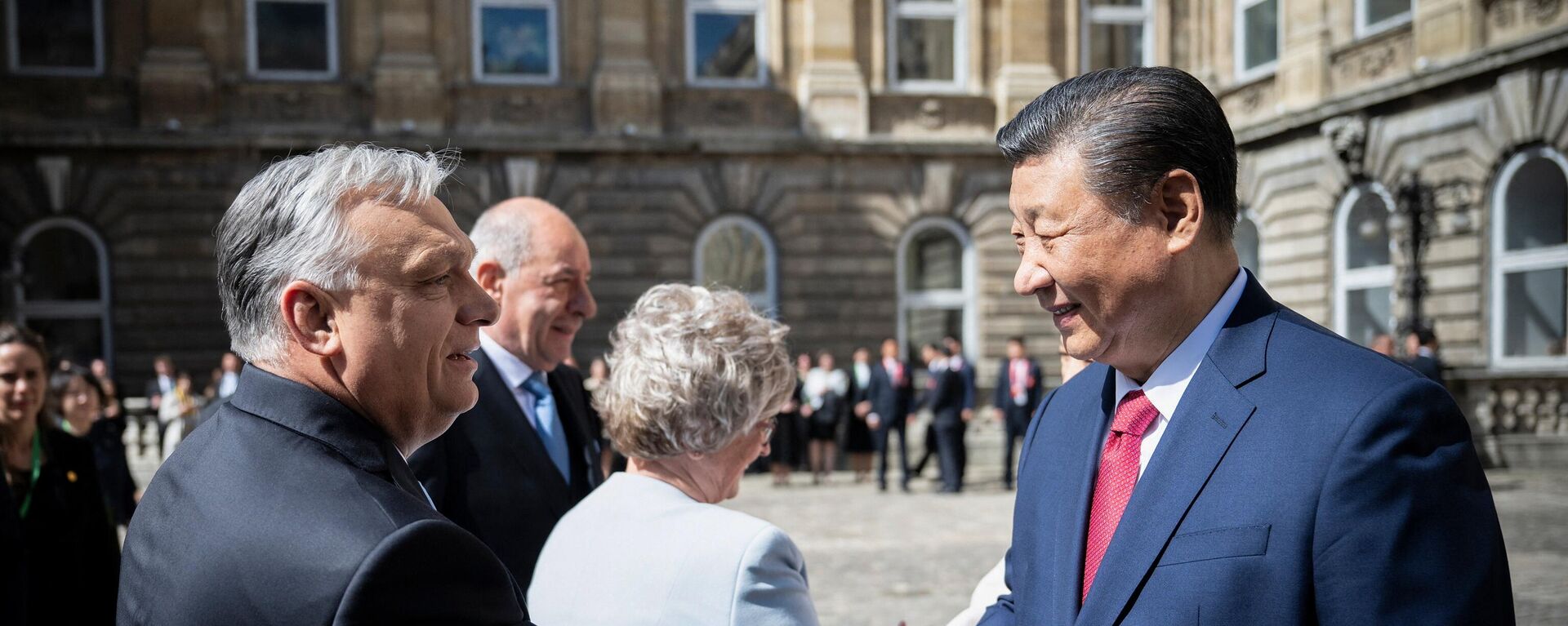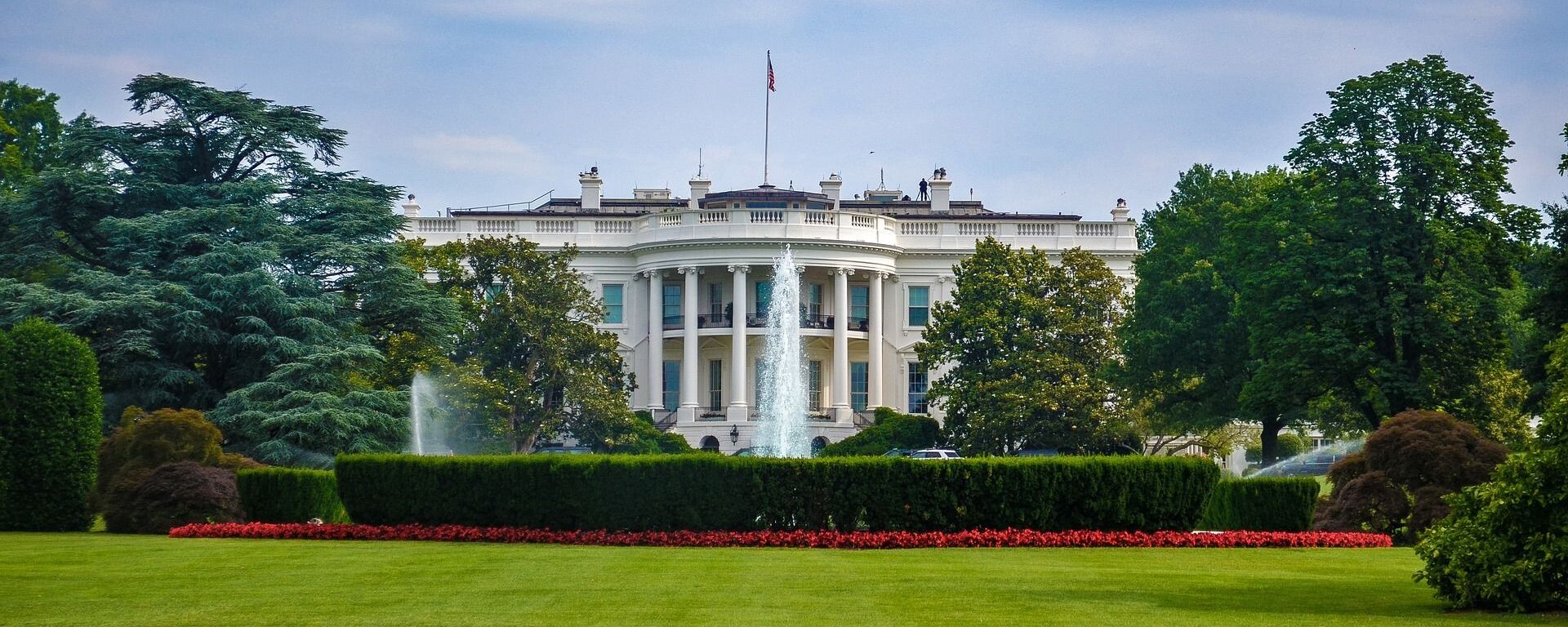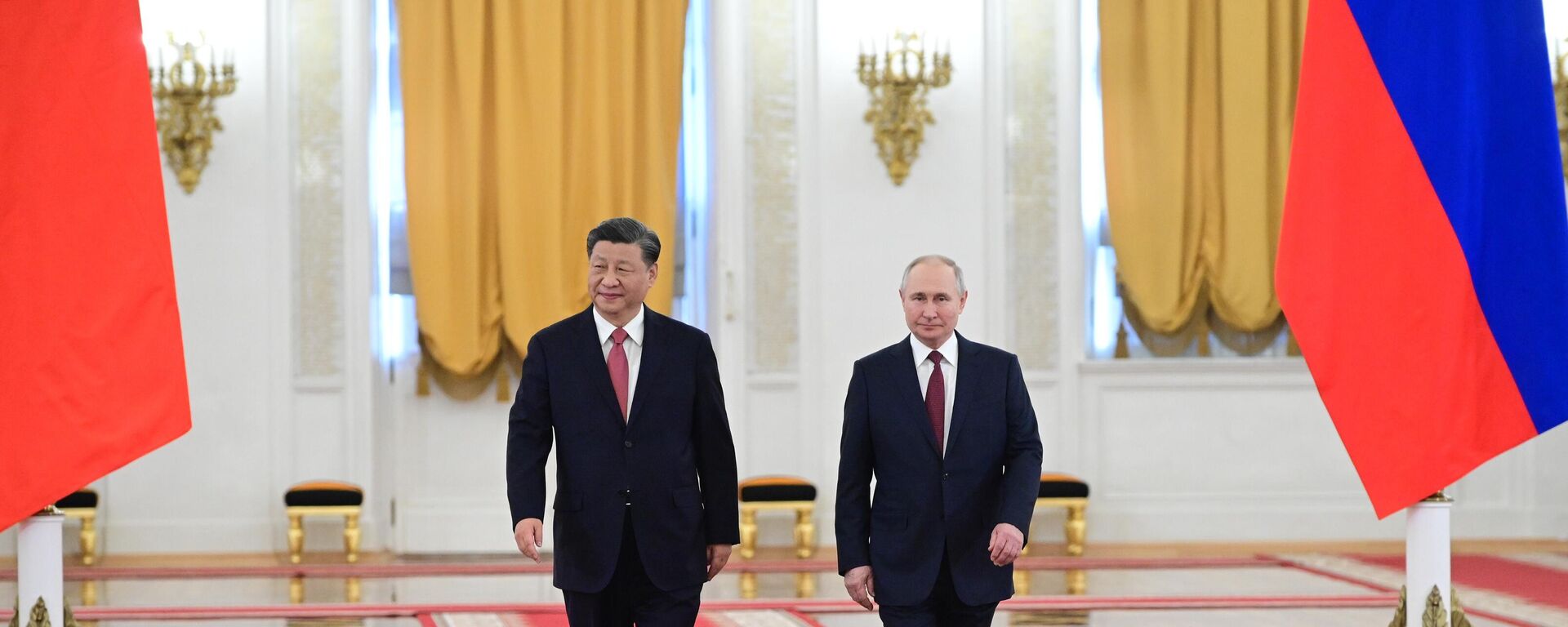https://sputnikglobe.com/20240510/xis-european-tour-china-offers-eu-way-out-of-economic-decline-1118378453.html
Xi's European Tour: China Offers EU Way Out of Economic Decline
Xi's European Tour: China Offers EU Way Out of Economic Decline
Sputnik International
Chinese Chairman Xi Jinping has concluded his European tour. While the Western press accuses him of seeking to drive a wedge within the EU, what were his primary objectives?
2024-05-10T18:18+0000
2024-05-10T18:18+0000
2024-05-10T18:18+0000
europe
viktor orban
emmanuel macron
european commission
european union (eu)
hungary
serbia
china
aleksandar vucic
world
https://cdn1.img.sputnikglobe.com/img/07e8/05/06/1118279880_0:67:3072:1795_1920x0_80_0_0_6064b686ee256a6c291a2af74db8e748.jpg
Chairman Xi Jinping visited France, Serbia, and Hungary during his five-day tour of Europe, with a focus on trade, investments, and promoting a new multipolar vision of global politics.Xi's meeting with French President Emmanuel Macron and European Commission President Ursula von der Leyen coincided with a looming trade war between the EU and China, as well as the bloc's attempts to force Beijing to exert pressure on Russia over its special military operation in Ukraine.The Chinese leader hasn't shifted his stance towards Moscow, whereas the EU has continued to accuse the People's Republic of what it calls "unfair trade practices". Nonetheless, China and France agreed to enhance cooperation in agri-food, finance, aviation, civil nuclear energy and other fields, as well as reiterate their commitment to a two-state solution for Israel and Palestine.The Serbian capital of Belgrade was the next leg of Xi's trip. The Chinese leader met with Serbian President Aleksandar Vucic on May 8 in his second visit to the country in eight years.In 2016, China and Serbia signed a joint statement on the Establishment of a Comprehensive Strategic Partnership, whereas eight years later, the two agreed to build a "community with a shared future" that was called "an upgrade" of relations between Belgrade and Beijing by the Chinese press. Serbia is the first European country – and an EU membership candidate – to ink an agreement on a "shared future" with China.In addition, Xi announced that a Free Trade Agreement with Serbia will come into force on July 1 with China expanding imports of agricultural products from the Balkan state. The two countries agreed to increase mutual settlements in local currencies with their central banks embarking on inking a clearing agreement in yuan to bolster bilateral cooperation. Belgrade also signaled that it is interested in keeping part of its foreign reserves in yuan.The Western press was quick to criticize Serbia for "cozying-up" with China and "joining" Beijing's effort to "build a coalition that challenges the US-led world order."Xi's decision to conclude his European tour in Hungary and meet with Prime Minister Viktor Orban stirred even greater annoyance in the mainstream media."Despite governing a country that has been a member of the European Union for 20 years, Hungarian PM Viktor Orban identifies more closely with Xi than with his peers in the bloc," argued Politico.Orban and Xi had much to talk about, given that China is seeking to make Hungary a new electronic vehicle (EV) production hub. Major Chinese car manufacturer Great Wall Motor (GWM) is due to build its first European plant near the Hungarian city of Pécs. Another Chinese industrial giant, BYD, is going to open its first European electric car factory in Szeged, Hungary, to produce an estimated 200,000 electric cars and plug-in hybrids a year. Szeged Television’s news claimed earlier this year that production could start in the second half of 2025. Remarkably, Szeged is located close to the Hungarian border with Serbia.Contemporary Amperex Technology (CATL), a Chinese battery manufacturer and technology company, likewise invested over €7 billion ($7.5 billion) in a 100-gigawatt battery plant in Debrecen, the capital of Hungary’s Northern Great Plain region.Orban announced that China was investing 6,400 billion forints (€16.5 billion) in Hungary during a joint press conference with Xi on May 9.By making Hungary an EV hub within Europe, China would get access to the bloc's market amid the European Commission's efforts to slap huge tariffs on Chinese EVs. Politico admitted, however, that the proposed tariffs that range from 15 to 30 percent, are unlikely to render Chinese carmakers uncompetitive, given their cost-effective production methods and strong supply chains.While Hungary's upcoming presidency of the EU won't give Hungary much power to make other European states change their policies towards China, the increasingly visible decline of the US and Western European powers might prompt the European bloc to improve ties with Beijing, according to the expert.Xi's European tour offered an alternative path for the EU to boost its growth by strengthening economic development agreements with Beijing and reopening trans-Eurasian trade corridors, the expert pointed out.
https://sputnikglobe.com/20240508/serbia-china-to-develop-belt-and-road-initiative---joint-statement-1118342578.html
https://sputnikglobe.com/20240510/xi-orban-talks-what-did-china-and-hungarys-leaders-agree-1118374910.html
https://sputnikglobe.com/20240510/us-poised-to-levy-new-tariffs-on-chinas-green-tech-1118378296.html
https://sputnikglobe.com/20240507/china-working-to-mitigate-us-impact-on-trade-exchanges-with-russia---envoy-1118316417.html
https://sputnikglobe.com/20240509/calling-the-bluff-aging-us-fleet-and-drained-stockpiles-no-match-for-china-and-russia-1118362489.html
hungary
serbia
china
Sputnik International
feedback@sputniknews.com
+74956456601
MIA „Rossiya Segodnya“
2024
News
en_EN
Sputnik International
feedback@sputniknews.com
+74956456601
MIA „Rossiya Segodnya“
Sputnik International
feedback@sputniknews.com
+74956456601
MIA „Rossiya Segodnya“
xi jinping's european tour, xi's meeting with macron, eu's looming trade war with china, china and serbia signed new agreement on shared future, china to invest in hungary, china is hungary's number one investor, hungary is slated to become a eu electric vehicles hub, hungary becoming a eu industrial hub with china's backing
xi jinping's european tour, xi's meeting with macron, eu's looming trade war with china, china and serbia signed new agreement on shared future, china to invest in hungary, china is hungary's number one investor, hungary is slated to become a eu electric vehicles hub, hungary becoming a eu industrial hub with china's backing
Xi's European Tour: China Offers EU Way Out of Economic Decline
Chinese Chairman Xi Jinping has concluded his European tour. While the Western press accuses him of seeking to drive a wedge within the EU, what were his primary objectives?
Chairman Xi Jinping visited France, Serbia, and Hungary during his five-day
tour of Europe, with a focus on trade, investments, and promoting a new multipolar vision of global politics.
Xi's meeting with French President Emmanuel Macron and European Commission President Ursula von der Leyen coincided with
a looming trade war between the EU and China, as well as the bloc's attempts to force Beijing to exert pressure on Russia over its special military operation in Ukraine.
The Chinese leader hasn't shifted his stance towards Moscow, whereas the EU has continued to accuse the People's Republic of what it calls "unfair trade practices". Nonetheless, China and France agreed to enhance cooperation in agri-food, finance, aviation, civil nuclear energy and other fields, as well as reiterate their commitment to a two-state solution for Israel and Palestine.
"The trade war has no obvious easy resolution," geopolitical analyst Come Carpentier de Gourdon told Sputnik. "Von der Leyen said that China should reduce its production and exports to help EU manufacturing and she wants a more balanced trade with greater access for European products to the Chinese market. However, the EU will also have to be more competitive to redress the imbalance. Otherwise, protectionism is the only way to revive and stimulate EU productivity."
The Serbian capital of Belgrade was the next leg of Xi's trip. The Chinese leader met with Serbian President Aleksandar Vucic on May 8 in his second visit to the country in eight years.
In 2016, China and Serbia signed a joint statement on the Establishment of a Comprehensive Strategic Partnership, whereas eight years later, the two agreed
to build a "community with a shared future" that was called
"an upgrade" of relations between Belgrade and Beijing by the Chinese press. Serbia is the first European country – and an EU membership candidate – to ink an agreement on a "shared future" with China.
In addition, Xi announced that a Free Trade Agreement with Serbia will come into force on July 1 with China expanding imports of agricultural products from the Balkan state. The two countries agreed to increase mutual settlements in local currencies with their central banks embarking on inking a clearing agreement in yuan to bolster bilateral cooperation. Belgrade also signaled that it is interested in keeping part of its foreign reserves in yuan.
The Western press was quick to criticize Serbia for "cozying-up" with China and "joining" Beijing's effort to "build a coalition that challenges the US-led world order."
Xi's decision to conclude his European tour in Hungary and meet with Prime Minister Viktor Orban stirred even greater annoyance in the mainstream media.
"Despite governing a country that has been a member of the European Union for 20 years, Hungarian PM Viktor Orban identifies more closely with Xi than with his peers in the bloc," argued Politico.
Orban and Xi
had much to talk about, given that China is seeking to make Hungary a new electronic vehicle (EV) production hub. Major Chinese car manufacturer Great Wall Motor (GWM) is due to build its first European plant near the Hungarian city of Pécs.
Another Chinese industrial giant, BYD, is going to open its first European electric car factory in Szeged, Hungary, to produce an estimated 200,000 electric cars and plug-in hybrids a year. Szeged Television’s news claimed earlier this year that production could start in the second half of 2025. Remarkably, Szeged is located close to the Hungarian border with Serbia.
Contemporary Amperex Technology (CATL), a Chinese battery manufacturer and technology company, likewise invested over €7 billion ($7.5 billion) in a 100-gigawatt battery plant in Debrecen, the capital of Hungary’s Northern Great Plain region.
Orban announced that China was investing 6,400 billion forints (€16.5 billion) in Hungary during a joint press conference with Xi on May 9.
By making Hungary an EV hub within Europe, China would get access to the bloc's market amid the European Commission's efforts to slap huge tariffs on Chinese EVs. Politico admitted, however, that the proposed tariffs that range from 15 to 30 percent, are unlikely to render Chinese carmakers uncompetitive, given their cost-effective production methods and strong supply chains.
"China sees Hungary, a transportation hub in the heart of Eastern Europe, as an important partner because PM Orban's government is not following EU policies and is committed to keeping strong relations with Russia, China, and other Eastern countries," Carpentier de Gourdon said.
"Hungary has a strong scientific and industrial tradition, ancient Eastern cultural and political connections, a reliable labor force, and does not wish to fall deeper into the orbit of Germany like the rest of 'Mitteleuropa'. Budapest's desire for neutrality makes it a desirable partner at a time when Switzerland has all but in name given up its neutrality."
While Hungary's upcoming presidency of the EU won't give Hungary much power to make other European states change their policies towards China, the increasingly visible decline of the US and Western European powers might prompt the European bloc to improve ties with Beijing, according to the expert.
Xi's European tour offered an alternative path for the EU to boost its growth by strengthening economic development agreements with Beijing and reopening trans-Eurasian trade corridors, the expert pointed out.
"Hungary can become, together with Serbia (which has just entered into a wide-ranging partnership with the PRC) and other Balkan and Visegrad nations a trailblazer in that direction," Carpentier de Gourdon concluded.
